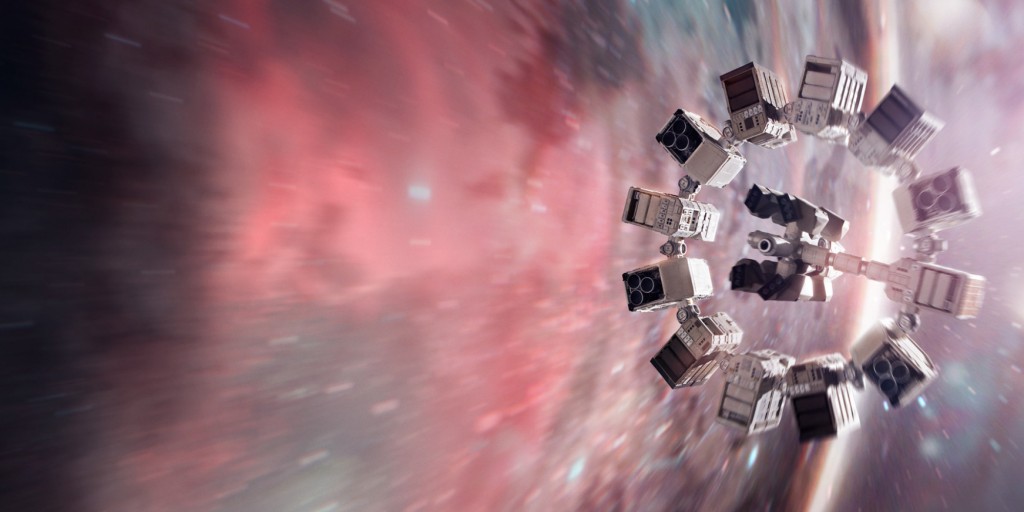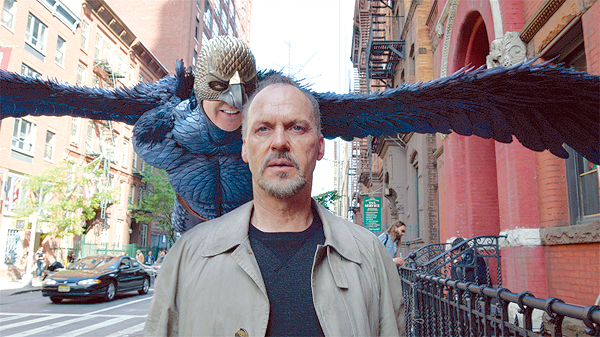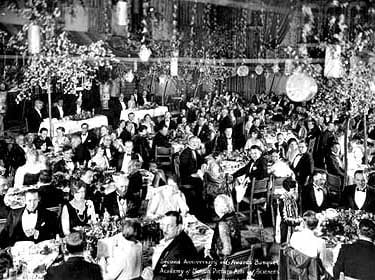The word “interstellar” literally means “between stars or planets.” Christopher Nolan’s film is about exactly that: Not a place, but a space between. “Humanity was born on earth,” a character observes early on. “But it was never meant to die here.”
Notice the language of destiny there; “was never meant” implies a purpose beyond mere survival. Is mankind meant for something greater than simple reproduction? Unfortunately, that’s the closest that Nolan comes to pointing us beyond the cosmos. For most of Interstellar, the achingly majestic images of the physical universe declare their own glory. In the end (no spoilers), man remains the true measure of man.
Interstellar is indeed a majestic piece of filmmaking. Its sights and sounds bring together the telescope and the imagination in an exhilarating fashion. Nolan’s box office triumphs (The Dark Knight films, The Prestige) have earned him enough capital to make a film that indulges his own fancies and excesses, much like Stanley Kubrick was allowed to fill 2001 with his own imaginative vision. And just as Kubrick’s film alienated those impatient with its philosophical orientation, Nolan’s movie might frustrate audiences hoping for some kind of Star Wars-meets-Gravity-meets-Inception. Interstellar is a movie for viewers willing to contemplate what they behold.
Cooper (Matthew McConaughey) is a widowed father of two, living with his children and father in law (John Lithgow) on what appears to be a corn farm, but is often unrecognizable due to earth’s unyielding environment. We gather early on that the planet is failing to produce food and sustain life; schools now exist to sort out the future farmers from collegians. Nolan never reveals what year it is, but Lithgow’s character implies that he grew up in the early 21st century (“When I was growing up, seemed like we had a new gizmo every day,” he recalls). There’s also a hint that the United States has become more paranoid and authoritarian, like when a schoolteacher informs Cooper that the Apollo missions were “propaganda intended to bankrupt the Soviets.”
After a mysterious message appears in the house, Cooper and his daughter Murph discover a secret facility that we learn is what remains of NASA, which went underground after it was deemed unnecessary to agrarian culture. Cooper is eventually asked to commandeer a spaceship that can travel to distant galaxies in search of a hospitable planet for humanity. His departure from his children is a truly heartbreaking scene and one of the movie’s best.
It turns out that searching for a new planet for the human race is complicated. In one case, Cooper and his team (which includes Anne Hathaway in another good performance) must rendezvous with another crew on a planet featuring skyscraper-sized tidal waves, an impeccably staged and visually awesome scene. An unexpected consequence from their time on this planet leads to another emotionally powerful moment between Cooper and his family.
Nolan is obviously in total command here. All of Interstellar bears his image, from the visual grandeur of the galaxies to a pivotal plot twist on an ice-planet (this isn’t your daddy’s Hoth). Sometimes this isn’t as rewarding script-wise. The dialogue between the astronauts is laden with too much scientific jargon, and too many monologues kill a scene’s momentum and sound like a poetry reading. The second act has pacing problems too, and at one point I felt as though Intersteller‘s pageantry would collapse under its own weight.
It didn’t, mainly due to an astonishing final 45 minutes that rank high on my list of all-time theatrical experiences. Nolan does what I was sure he wouldn’t do, and that is follow his hero into depths of time and space and infinity that are dazzling and awesome and beautiful. If it sounds like I’m describing the famous “star-gate” sequence from 2001, that’s not a bad comparison, but neither is it fair. Suffice to say that if you love movies, the denouement of Interstellar will be utterly transporting for you. Some have complained about the movie’s ending, but I found it satisfying.
God is absent from Interstellar‘s universe. At a key moment late in the film Cooper realizes that the key to man’s survival is mankind itself. This kind of humanism is par for the course for most science fiction and it would be unfair to single out Interstellar for critique on that point. Yet while I beholding this film’s majestic images, I could not help but wonder if we are living in an age in which inwardly focused optimism, driven by science, is untenable. Far from living among the stars, we are, as C.S. Lewis observed, frequently content with the mud pies in the slums. Odd it seems to contemplate the notion of a better humanity through science when much of man’s science is dedicated to war, oppression, and sexual anarchy.
One of Nolan’s characters, a professor, quotes Dylan Thomas: “Do not go gentle into that good night; rage, rage against the dying of the light.” This we do, but not as those who have no hope. Even when the light dies, it will come back again. Cooper is correct: Human beings were not meant to die, but meant to live. If we must live among the stars, let us hear their songs of worship, and make our home with the Father of whom they sing.
Paramount Pictures presents a Christopher Nolan film
Written by Christopher and Jonathan Nolan
169 minutes/PG-13. Full credits at IMDB.












